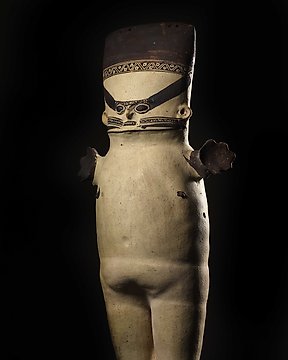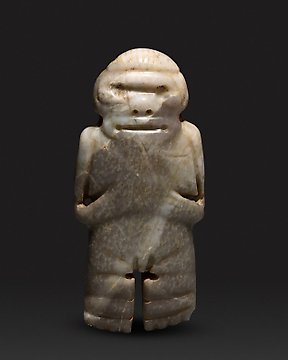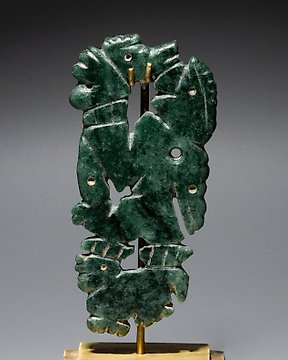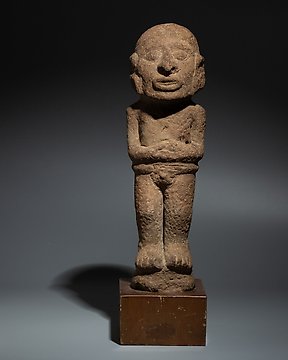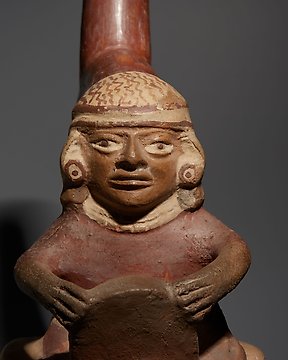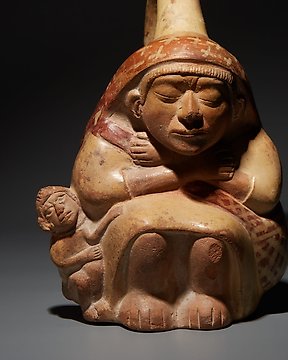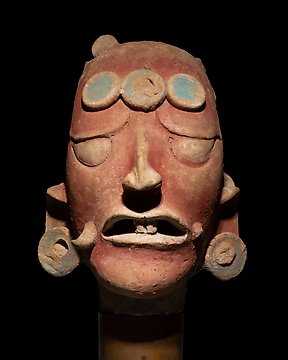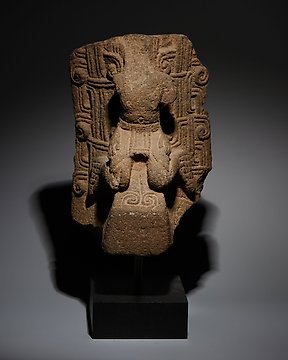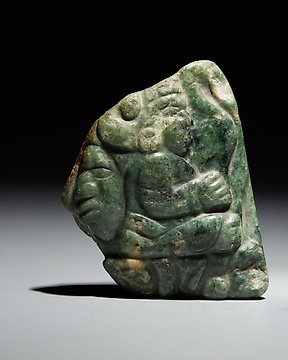Good seller: fast shipment, good packing and a very nice object. Thank you!
Προβολή μετάφρασηςDiquis - Chiriqui, Κόστα Ρίκα Χρυσός Δίσκος. 700-1550 μ.Χ. 9 εκ. Ισπανική άδεια εισαγωγής.
Αρ. 85410233


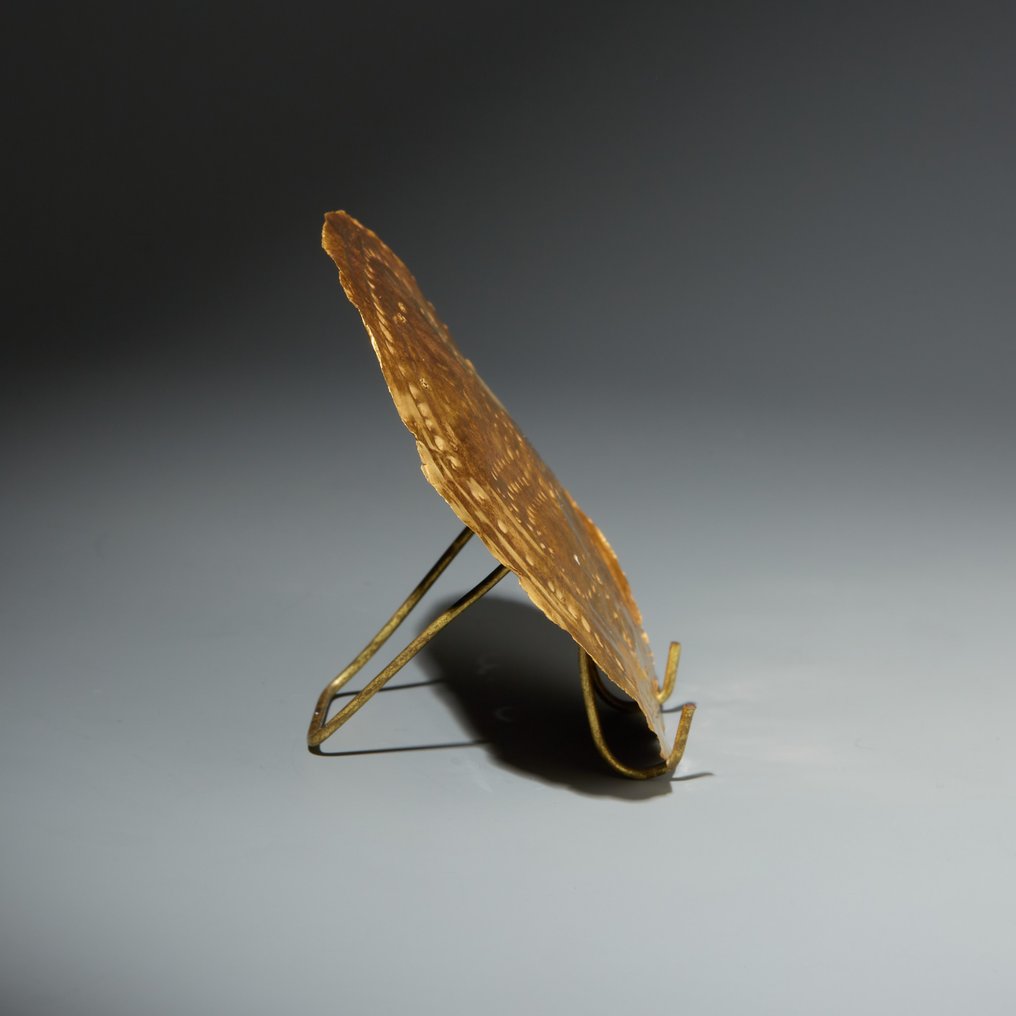
Disc
- Very fine -
Diquis - Chiriqui, Costa Rica, 700-1550 AD.
Gold.
9 cm. 5.91 Grams.
PROVENANCE:
Banks - Primitive, Inc, Maryland, USA, 30 September 1994.
Romy Rey Collection, London. 1970.
CONDITION: Intact
The Diquis culture arose in the territory of what is now Costa Rica, along the coasts of the Pacific Ocean and Caribbean Sea and in the inland mountains and valleys. This area is a resource-rich tropical forest, although the Pacific watershed has a dry summer season. The word diquis means Great Waters or Great River in the Boruca language, and the delta of the great Diquis River is a major feature of the region’s geography.
The Diquis culture is well known for its fine metalwork, particularly in gold and in the gold-copper alloy known as tumbaga. These metals were used to produce large quantities of finely worked pendants, bracelets, ornaments, earpieces, and adornments for clothing, many with images of jaguars and eagles. Other finds attribute to this culture include funeral masks and figurines, most representing birds. Apart from their work in gold, the Diquis are renowned for their stone sculptures, such as the large stone spheres found near cemeteries and the jaguar-shaped corn grinders, which display influences from groups that inhabited the territory of modern-day Colombia. Stone statues and effigies depict dead individuals and chiefs, carrying trophy heads or in positions of prayer. Others are male, female, or figures of indeterminate sex that are naked but marked with incisions that represent adornments such as necklaces and bracelets, body paint, and tattoos. The Diquis culture produced reddish-brown ceramic vessels that were decorated mainly by modelling and often included a tripod base. Decoration often takes the form of crocodiles or fishes. These ceramic pieces are often found alongside other vessels painted with red and black on a cream background and featuring simple geometric motifs, and other very thin-walled works modelled in animal shapes.
Notes:
The seller guarantees that he acquired this piece according to all national and international laws related to the ownership of cultural property. Provenance statement seen by Catawiki.
The seller will take care that any necessary permits, like an export license will be arranged, he will inform the buyer about the status of it if this takes more than a few days.
The piece includes authenticity certificate.
The piece includes Spanish Export License.
Ιστορία πωλητή
Disc
- Very fine -
Diquis - Chiriqui, Costa Rica, 700-1550 AD.
Gold.
9 cm. 5.91 Grams.
PROVENANCE:
Banks - Primitive, Inc, Maryland, USA, 30 September 1994.
Romy Rey Collection, London. 1970.
CONDITION: Intact
The Diquis culture arose in the territory of what is now Costa Rica, along the coasts of the Pacific Ocean and Caribbean Sea and in the inland mountains and valleys. This area is a resource-rich tropical forest, although the Pacific watershed has a dry summer season. The word diquis means Great Waters or Great River in the Boruca language, and the delta of the great Diquis River is a major feature of the region’s geography.
The Diquis culture is well known for its fine metalwork, particularly in gold and in the gold-copper alloy known as tumbaga. These metals were used to produce large quantities of finely worked pendants, bracelets, ornaments, earpieces, and adornments for clothing, many with images of jaguars and eagles. Other finds attribute to this culture include funeral masks and figurines, most representing birds. Apart from their work in gold, the Diquis are renowned for their stone sculptures, such as the large stone spheres found near cemeteries and the jaguar-shaped corn grinders, which display influences from groups that inhabited the territory of modern-day Colombia. Stone statues and effigies depict dead individuals and chiefs, carrying trophy heads or in positions of prayer. Others are male, female, or figures of indeterminate sex that are naked but marked with incisions that represent adornments such as necklaces and bracelets, body paint, and tattoos. The Diquis culture produced reddish-brown ceramic vessels that were decorated mainly by modelling and often included a tripod base. Decoration often takes the form of crocodiles or fishes. These ceramic pieces are often found alongside other vessels painted with red and black on a cream background and featuring simple geometric motifs, and other very thin-walled works modelled in animal shapes.
Notes:
The seller guarantees that he acquired this piece according to all national and international laws related to the ownership of cultural property. Provenance statement seen by Catawiki.
The seller will take care that any necessary permits, like an export license will be arranged, he will inform the buyer about the status of it if this takes more than a few days.
The piece includes authenticity certificate.
The piece includes Spanish Export License.
Ιστορία πωλητή
- 747
- 7
- 0
super 💯💯💯💯💯
Προβολή μετάφρασηςIl pezzo è arrivato in condizioni perfette il pacco era protetto alla perfezione
Προβολή μετάφρασηςBuenos días, señor. ¡Gracias por las precauciones de embalaje Tip / Top! Muy contento con mi compra. ¡Gracias!
Προβολή μετάφρασηςPerfecto! :)
Προβολή μετάφρασηςWunderbares Stück. Alles wie beschrieben. Hervorragender Kontakt.
Προβολή μετάφρασηςExtremely rapid courrier service from Barcelona to Flanders, picture was nicely and carefully packaged. Muchas gracias!
Προβολή μετάφρασηςVery fine specimen! Thanks.
Προβολή μετάφρασηςgoede foto's, goede omschrijving, goed verpakt en snel verzonden.
Προβολή μετάφρασηςmolto bello tutto ok
Προβολή μετάφρασηςPezzo come da descrizione, davvero notevole. Venditore molto consigliato in quanto gentile e disponibile. spedizione molto veloce. Ottimo!
Προβολή μετάφρασηςVenditore davvero ottimo e gentile. Merce come da descrizione, spedizione veloce. Ottimo l'avere certificato di autenticità.
Προβολή μετάφρασηςUn 100 como empresa un 100 como envío . Empresa muy especial con mucha exquisitez en todos los productos y en personal . Muchas gracias
Προβολή μετάφρασηςAll well! Thanks.
Προβολή μετάφρασηςVery nice and fine cut little jewel! Well packed too! Thanks!
Προβολή μετάφρασηςnice piece and very fast shipping!
Προβολή μετάφρασηςEs una maravilla de moneda, donde se le nota los pasos de los años y me encanta. Servido muy rápido y bien empaquetado. Con su certificación. Qué más se puede pedir?
Προβολή μετάφρασηςSnelle en correcte levering, alleen was de verpakking voor het schilderij niet stevig genoeg.
Προβολή μετάφρασηςHerzlichen Dank!
Προβολή μετάφρασηςAll OK and with very fast shipping.
Προβολή μετάφρασηςPrachtig schilderij. Zo blij mee. Zeer nette verkoper en zeer snelle levering.
Προβολή μετάφρασηςperfect ! very fast and high quality delivery !
Προβολή μετάφρασηςAll well! Thanks.
Προβολή μετάφρασηςVendeur très professionnel, top +++×
Προβολή μετάφρασης- 747
- 7
- 0
Good seller: fast shipment, good packing and a very nice object. Thank you!
Προβολή μετάφρασης